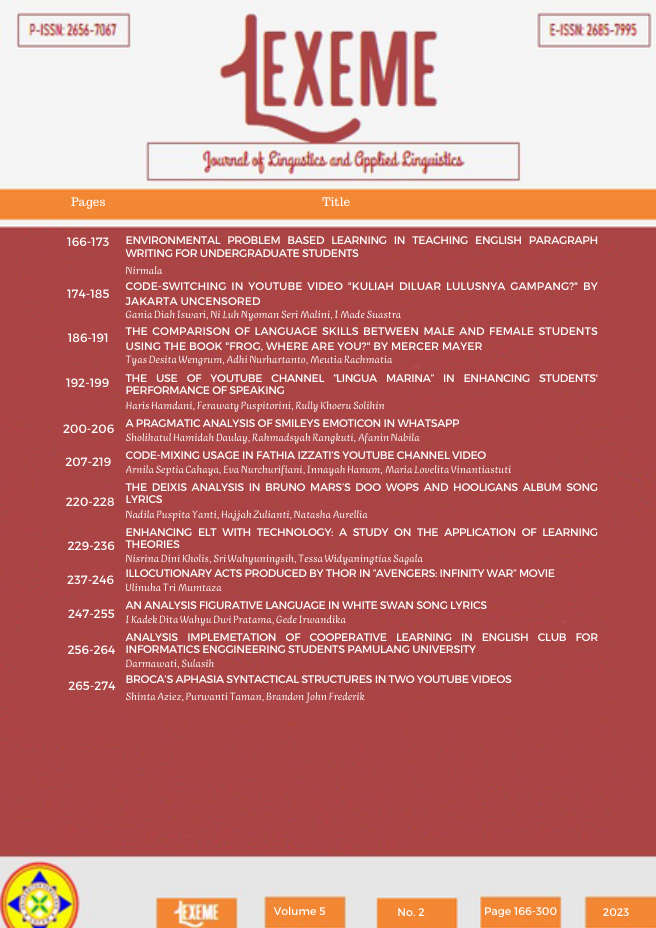ENVIRONMENTAL PROBLEM BASED LEARNING IN TEACHING ENGLISH PARAGRAPH WRITING FOR UNDERGRADUATE STUDENTS
DOI:
https://doi.org/10.32493/ljlal.v5i2.18381Keywords:
environmental awareness, environment-based education, problem based learning, writing skillAbstract
Environmental awareness must be urgently strengthened to all people in the world from children to adults. Integrating environment based education in teaching and learning process can become a solution to foster it. This article reports the implementation of environmental problem based in teaching writing skill on the first-year students of English Language Education of a private university in Tangerang. The total number of the students is 25, and the research was done by using qualitative method namely explanatory case study. The data were collected through questionnaire, interview, and observation. Then it was analyzed through three steps namely data reduction, data presentation, and conclusion. It answers the questions as follow: (1) How is the implementation of environmental PBL in teaching writing?; (2) How is the writing skill of the first year students of English Language Education after being taught by using environmental problem-based learning?; and (3) How is the environmental awareness of the first year students of English Language Education? Therefore, the result of the research reveals three major findings: (1) description of the implementation of environmental problem based learning in teaching writing; (2) the description of students’ writing skill after being taught by using environmental problem-based learning; and (3) the description of students’ environmental awareness. Based on the research findings, it can be summarized that the implementation of environmental problem based learning to the first-year students of undergraduate school can be used as an alternative method in the teaching writing skill in order to simultaneously develop students’ writing skill and foster their environmental awareness.
References
Abbas, M. F. F. & Herdi. (2018). Solving the Students’ Problems in Writing Argumentative Essay through Collaborative Writing Strategy. English. Review: Journal of English Education. 7(1). DOI: https://doi.org/10.25134/erjee.v7i1.1499
Abdalla & Gaffar, A. M. (2011). Seven Steps of PBL Implementation: Tutor’s Manual. Retrieved from https://www.researchgate.net/publication/235914109_ Blueprints_In_Health_profession_Education_Series_The_Seven_Steps_Of_Pbl_Implementation_Tutor_Manual/citation/download
Aslan, Alper. (2021). Problem- based learning in live online classes: Learning achievement, problem-solving skill, communication skill, and interaction. Computers & Education, 171.
Basri, Zain, Jaafar, Basri, & Suja, F. (2012). Introduction to Environmental Engineering: A Problem-based Learning Approach to Enhance Environmental Awareness among Civil Engineering Students. Procedia - Social and Behavioral Sciences, 60, 36-41.
Boardman & Frydenberg, J. 2002. Writing to Communicate: Paragraphs and Essays, (2nd edition). New York: Pearson Education. Inc.
Brown, H. D. (2004). Language Assesment Principles and Classroom Practices. New York: Pearson Education.
Brown, H. D. (2015). Teaching by principles: An interactive approach to language pedagogy (5 th ed.). White Plains, New York: Pearson Education.
Creswell, John W. (2008). Educational Research: Planning, Conducting, and Evaluating Quantitative and Qualitative Research. 3rd ed. New Jersey: Merrill Prentice Hall.
De Graff & Kolmos, A. (2003). Characteristics of Problem-Based Learning. Int. J. Engng Ed., 19(5), 657-662. Printed in Great Britain.
Fachrurrazy. (2011). Teaching English as a foreign language for teachers in Indonesia. Malang: Universitas Negeri Malang Press.
Harmer, J. (2001). The Practice of English Language Teaching. London: Pearson Education Limited.
Harmer, J. (2004). How to Teach Writing. Malaysia: Longman.
Harris, D. P. (1969). Testing English as a Second Language. New York: Mc Graw Hill Book Company.
Hyland, K. (2002). Teaching and Researching Writing. London: Longman.
Hyland, K. (2004). Genre and Second Language Writing. US: The University of Michigan Press.
Kenney, B. (2008). Revitalizing the One-Shot Instruction Session Using Problem-Based Learning. Librarian Publications. 47. 10.5860/rusq.47n4.386.
McGibbon & Belle, J.P.V. (2015). Integrating environmental sustainability issues into the curriculum through problem-based and project-based learning: a case study at the University of Cape Town. Current Opinion in Environmental Sustainability, 16, 81-88.
Meyers, A. (2005). Gateways to Academic Writing: Effective Sentences, Paragraphs and Essays. New York: Pearson Education, Inc.
Mukti, A. (2016). The Effectiveness of Dialogue Journals in Improving the Skill in Writing Narrative Texts. IJEE (Indonesian Journal of English Education), 3(1), 1-14 doi:10.15408/ijee.v3i1.3444
Nirmala, N., & Ramalia, T. (2017). PEER EDITING TO ENHANCE STUDENTS’ABILITY IN WRITING SENTENCES: A CLASSROOM ACTION RESEARCH. JIPIS, 26, 47-52.
Richards and Renandya, W., A. (2010). Methodology in Language Teaching (An Anthology of Current Practice). US: Cambridge University Press.
Savery, John R. (2006). Overview of Problem-Based Learning: Definitions and Distinctions. Interdisciplinary Journal of Problem-Based Learning, 1, 9-20.
Ting, K., Cheng, C., & Ting, H. (2021). Introducing the problem/project based learning as a learning strategy in University Social Responsibility Program - A study of local revitalization of Coastal Area, Yong-An District of Kaohsiung City. Marine Policy, 131.
Untoro, B. (2016). The Effect of Group Investigation and Learning Style on Students’ Writing of Analytical Exposition. IJEE (Indonesian Journal of English Education), 3(1), 29-45. doi:10.15408/ijee.v3i1.3445







